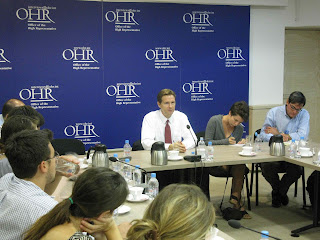Jumping into the "deep end of the pool"
Students arrived yesterday; we spent 90 minutes together last night to get them acclimated and prepare them for the week ahead.
This morning, we met at 10:00 am to prepare them further for our very first site visit (see below) and to give them an overview of the complexities (understatement of the year) of Bosnian politics. Dr. Esmir Ganic, of the American University of Bosnia-Herzegovina (BiH), spoke at length about BiH politics, governance, and international relations. Wow, is it confusing! Even he was having some difficulty making sense (for us) of the seemingly non-sensical. One "state" (BiH); two "entitites" - a "Federal entity" (51% Bosnia) plus Republica Srbska (49%), along with 10 "cantons" within the 51% Federal entity. Oh, and there are 3 Presidents (so to speak) within BiH. And there is a High Representative for BiH, an international official overseeing civilian governance. (And this is the "short and sweet" description).
With that as our foray, we then went to visit the International Commission on Missing Persons (ICMP).
We had 2 hours of presentation plus Q&A/discussion with Ms. Klaudia Kuljuh, Chief of Cabinet to the Western Balkans Director, and Mr. Adnan Rizvic, Deputy Director of Forensic Science & Identification Systems.
ICMP was set up in 1996, just after the Dayton Accords, to find missing persons throughout the Western Balkans - mostly those killed in massacres and genocide and buried in over 3,000 mass graves. These heroes, these valiant souls, do forensic science (Adnan said: "think CSI"), helping local governments develop their own capacity to find and excavate suspected mass grave sites, do the DNA lab work, and develop the database so as to "match" DNA samples from living relatives who have last family members during the 1990s with DNA samples tested after discovering any part of a skeletal remain of a missing person.
ICMP also works with families of missing persons, and with NGOs that work with these families to provide socio-psychological support, and to protect and promote the rights of these survivors.
In Bosnia, over 21,000 persons have been identified - out of an estimated 30,000 missing persons.
ICMP has become such a success story that it has become the global leader in this work, helping out communities around the world including those hit by Hurricane Katrina, the Tsunami in S.E. Asia, and victims of wars in Iraq and Libya.
Temperatures are "scorchers" these days ... after this amazing "baptism in fire", or "jumping into the deep end" of information regarding the 1990s massacres and genocide in the Balkans, we gave our students the rest of the evening to get rest, water!!, sim cards (for phones), exchange money, and otherwise prepare for tomorrow and the week ahead.
Stay tuned!
This morning, we met at 10:00 am to prepare them further for our very first site visit (see below) and to give them an overview of the complexities (understatement of the year) of Bosnian politics. Dr. Esmir Ganic, of the American University of Bosnia-Herzegovina (BiH), spoke at length about BiH politics, governance, and international relations. Wow, is it confusing! Even he was having some difficulty making sense (for us) of the seemingly non-sensical. One "state" (BiH); two "entitites" - a "Federal entity" (51% Bosnia) plus Republica Srbska (49%), along with 10 "cantons" within the 51% Federal entity. Oh, and there are 3 Presidents (so to speak) within BiH. And there is a High Representative for BiH, an international official overseeing civilian governance. (And this is the "short and sweet" description).
With that as our foray, we then went to visit the International Commission on Missing Persons (ICMP).
We had 2 hours of presentation plus Q&A/discussion with Ms. Klaudia Kuljuh, Chief of Cabinet to the Western Balkans Director, and Mr. Adnan Rizvic, Deputy Director of Forensic Science & Identification Systems.
ICMP was set up in 1996, just after the Dayton Accords, to find missing persons throughout the Western Balkans - mostly those killed in massacres and genocide and buried in over 3,000 mass graves. These heroes, these valiant souls, do forensic science (Adnan said: "think CSI"), helping local governments develop their own capacity to find and excavate suspected mass grave sites, do the DNA lab work, and develop the database so as to "match" DNA samples from living relatives who have last family members during the 1990s with DNA samples tested after discovering any part of a skeletal remain of a missing person.
ICMP also works with families of missing persons, and with NGOs that work with these families to provide socio-psychological support, and to protect and promote the rights of these survivors.
In Bosnia, over 21,000 persons have been identified - out of an estimated 30,000 missing persons.
ICMP has become such a success story that it has become the global leader in this work, helping out communities around the world including those hit by Hurricane Katrina, the Tsunami in S.E. Asia, and victims of wars in Iraq and Libya.
Temperatures are "scorchers" these days ... after this amazing "baptism in fire", or "jumping into the deep end" of information regarding the 1990s massacres and genocide in the Balkans, we gave our students the rest of the evening to get rest, water!!, sim cards (for phones), exchange money, and otherwise prepare for tomorrow and the week ahead.
Stay tuned!



Comments
Post a Comment